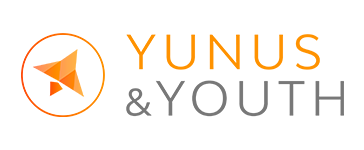Yunus & Youth exists to empower young people around the world – young people passionate about making a change, and who are working on ideas that come from an intimate knowledge of their local contexts. The Fellowship may only last six months but during that time Y&Y introduces tools intended for the long-term development and support of its Fellows. The partnership with Ingo Michelfelder Postdoctoral Researcher at the Harvard Kennedy School Social Innovation and Change Initiative and creator of the pioneer Lean Impact Measurement Tool is one such example.
Y&Y’s co-founder Cecilia Chapiro met Ingo during a conference at Harvard, where they instantly recognised the compatibility of their work and approaches. Y&Y puts a lot of emphasis on metrics, and tracks the progress of its Fellows from the beginning of their work together. What became clear early on is that many of the social entrepreneurs, as they begin the Fellowship, do not measure their own progress. Some do not even measure something as simple as their income –often doing exceptionally well on the ‘social’ but slightly neglecting the ‘business’. Ingo has, by now, worked with hundreds of early stage ventures, and has been constantly refining his methodology to develop his system in order to give social entrepreneurs the necessary tools and processes so that they can, to put it simply, understand their potential. Their official collaboration started with last year’s cohort. Y&Y is the only organisation outside of the academic ecosystem with which Ingo works.
The impact assessment research field is very heterogeneous right now, and this innovation and a broad range of approaches is necessary for finding out what works and what doesn’t. Due to the challenges involved in predicting future impact, especially in young ventures, there are a lot of initiatives and researchers working on optimising this for the benefit of both the social enterprises and the investors. In the early stages, it is impossible – and far too expensive – to receive bespoke advice and measure the impact as a single venture, and they can’t follow the normal impact assessment method since they aren’t able to measure long-term past performance. Not enough data. At the same time, all social businesses are different, and a ‘one size fits all’ approach also doesn’t work. The middle way is a tool that can develop and grow with each organisation, and is simple enough to use that it is seen as a benefit, and not a burden, to each venture.
Eventually this will lead to a standardisation of the tools available, but for now more voices are certainly necessary. Ingo’s is one of these voices. He is working on developing a Social Impact Measurement Tool that can be scalable, user-friendly, and simple enough that the users want to keep using it to help themselves. Ingo makes it clear that it is all part of a longer process and the Lean Impact Measurement Tool he has designed for Y&Y is constantly developing. Even between the first and second year of it being part of the Y&Y Fellowship offer, there have been improvements made on the user-friendliness and the methodology. The aim is to help early stage ventures to focus on the right impact areas, and to be able to make informed decisions to take their businesses to the next level. The difference in which Ingo works with Y&Y, as opposed to working with the ventures at Harvard and at MIT, where Ingo conducted his research previously, is that it is all online and has been from the beginning. Additionally, the Fellows are full of passion and ideas, but largely do not have access to the institutional support that the others with whom Ingo works do – so this collaboration is a learning curve, and of huge benefit, to everyone.
Some of the previous Y&Y Fellows still use Ingo’s Tool, and found it to be very dynamic, interactive and easy to use. Renata Rizzi, founder of Utopiar, said that the outcome of using the Social Impact Measurement Tool was a new business plan. She says: “Ingo helped us to better understand the indicators of our social impact, how to measure and analyse them in order to keep improving and increasing the desired impact. Being a small organisation, we need to have this clear so we know what to prioritise and deliver the best solution to our beneficiaries.” Another Fellow, Yasmin Morais, founder of the RefEd Initiative, touched on another important point: “It gave me the opportunity to look deeper into my initiative’s activities and to address how they contributed to its mission”. As Y&Y works with social enterprises, which have social impact at their heart, it’s crucial to recognise that measuring the impact is as much about reaching those social impact goals, as it is about financial growth. Predictions of either are almost impossible to achieve, but the Social Impact Measurement Tool makes it seem less necessary to make predictions, and finds an alternative way to optimise the decision-making processes of ventures, their beneficiaries and their investors.
As the collaboration between Ingo and Y&Y deepens, and the Lean Impact Measurement Tool develops, the already significant benefits of the Y&Y Fellowship will also keep increasing. By measuring impact, the Tool has its own impact that reaches far beyond the individual ventures – its already helping countless young entrepreneurs to refine their businesses and, as the scene continues to expand and more young people turn their ideas into reality, it will help many more still.
